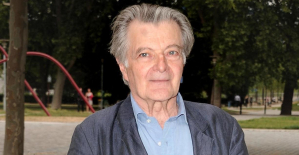If you google “Manifesto for Peace”, you will first find numerous texts in which well-known representatives from German politics, security experts, journalism and civil society systematically criticize the text by the authors Alice Schwarzer and Sahra Wagenknecht.
This makes it clear: German democracy in all its diversity is defending the decision of the federal government to supply arms to Ukraine, and in doing so it is also defending itself – supported by the majority of the German population.
The temptation is therefore great not to read the text of the manifesto at all and simply end my contribution here. But more than half a million people have already signed the manifesto. Shouldn't I react to that?
Maybe not, because the authors are not addressing me at all, not Ukraine as a whole. They only appear as a bargaining chip. This is where the first fundamental error of the manifesto lies: the authors chose the wrong addressee. Why are they appealing to the Federal Chancellor, but not to the real and only warmonger Putin? He could easily end the war by withdrawing his troops from Ukraine and stopping the killing.
Unfortunately, however, the authors remain silent when it comes to the subject of Russia. At the beginning of the text you write: "Women were raped, children were frightened, an entire people was traumatized." But what is actually stopping you from naming the perpetrators? Russian soldiers rape women, scare children and traumatize an entire people. What is so difficult about saying this?
There is no appeal in the manifesto to Putin to desist from his plan to annihilate Ukraine. One searches in vain for a condemnation of the illegal aggression against Ukraine and the documented horrific war crimes committed by Russian troops. So I have to read the text after all – for my country.
Surprisingly, up to the beginning of the second sentence of the second paragraph, I can even agree with the authors. The situation is indeed serious, more so than ever, and Ukrainians need full solidarity. Point. But what follows after that does not meet my approval in any way.
Already in the next sentence, introduced with a meaningful "but", the manifesto begins to relativize Russia's war of aggression against Ukraine by putting both warring parties, i.e. aggressor and victim, on the same level.
Here, ignorance and overconfidence combine with a reluctance to be disturbed in one's own peace. So that the latter does not happen, Ukraine should finally calm down - this is the only way to understand the text. They want to sacrifice Ukraine's freedom and sovereignty in order to achieve European peace.
But that would only be an apparent peace. Because if the demands of the manifesto were followed, this would not bring peace, but only the subjugation of Ukraine - with no prospect of a lasting, reliable state of peace.
"Negotiating does not mean surrendering," write Schwarzer and Wagenknecht. Is correct. But it becomes more difficult when they continue to state: “Negotiating means making compromises, on both sides.” Because they say nothing about what such “compromises” should look like. How and under what conditions Russia is to be brought to the negotiating table at all, since it is obviously not interested in that – no statement.
And so the fundamentally correct demand for diplomatic initiatives becomes cheap and dangerous. So far, Moscow has aggressively ignored requests to come to the negotiating table, stop the war and withdraw from Ukraine. Instead, it escalates every day because it still believes it can win the war.
So, let me guess what the manifesto means by “compromise” on the part of Ukraine: to accept the loss of the Russian-occupied territories (about 15 percent of Ukrainian territory), surrender the population there to the Russian machine of annihilation, and then massive ones waiting for Russia to attack.
What happens under Russian occupation became visible in Bucha, Izyum and Mariupol. Torture chambers, mass executions of civilians, deportation of Ukrainian children, the eradication of the Ukrainian language and identity. Do the authors really think that would be reasonable for the Ukrainians who are supposed to remain under Russian rule? And this possibly for a worthless Russian promise not to conquer more parts of Ukraine?
Because the past few years have shown that this is how Russia negotiates. Putin has ruled Moscow for 23 years, but who has ever achieved anything in negotiations with him – from Sarkozy in 2008 on Georgia to Biden, Macron and Scholz in 2022 on Ukraine? Are they all bad diplomats? Or could it be because diplomacy simply doesn't work with war criminals and chronic liars?
Do the authors of the “Manifesto for Peace” seriously believe that Russia will be content with the occupied regions and will live peacefully next to a sovereign Ukraine that is to become a member of the EU? In truth, what Moscow wants is for sovereign Ukraine to cease to exist. As long as this is the case, there can be no reliable peace - not for Ukraine, but also not for the rest of Europe.
Nobody denies negotiations or peace as a concept. "The war will end with negotiations, but the military balance of power at the end of the war will decide the peace afterwards," writes Claudia Major, and I can only agree. At this point, the negotiation window remains closed. The only open window leads to suicide or capitulation.
It would be more honest if Schwarzer and Wagenknecht explained the logic of their manifesto to the public like this: “Imagine you were dealing with a serial killer who killed your parents, kidnapped your son and gave him a new name; who is raping your daughter at this moment and who is also claiming part of your apartment for himself. In this case, our advice is: do not call the police, but negotiate a compromise with him.” That would bring your supposed peace appeal much closer to reality.
But it would be even better if everyone who was honest about their desire for peace would not go to the Brandenburg Gate on February 25th to demand "negotiations", but instead go to the nearby Russian embassy and call out: " Stop the crimes! Withdraw your troops!”
However, I have the suspicion that the authors are not concerned with peace at all. Or if she does, it's just for her peace of mind. But we want real peace for Ukraine, so that the whole of Europe can live free from the fear of war in the long term. Such a peace does not fall from the sky, but has to be fought for.
To do this, Ukraine needs solidarity support. Nobody is asking Germany to become a “party to the war”. Rather, it is about supporting a warring party that is defending itself, democracy and European security with empathy and commitment. And above all with all the weapons it needs to fight for a just and lasting peace.
"Kick-off Politics" is WELT's daily news podcast. The most important topic analyzed by WELT editors and the dates of the day. Subscribe to the podcast on Spotify, Apple Podcasts, Amazon Music, among others, or directly via RSS feed.

 His body naturally produces alcohol, he is acquitted after a drunk driving conviction
His body naturally produces alcohol, he is acquitted after a drunk driving conviction Who is David Pecker, the first key witness in Donald Trump's trial?
Who is David Pecker, the first key witness in Donald Trump's trial? What does the law on the expulsion of migrants to Rwanda adopted by the British Parliament contain?
What does the law on the expulsion of migrants to Rwanda adopted by the British Parliament contain? The shadow of Chinese espionage hangs over Westminster
The shadow of Chinese espionage hangs over Westminster Parvovirus alert, the “fifth disease” of children which has already caused the death of five babies in 2024
Parvovirus alert, the “fifth disease” of children which has already caused the death of five babies in 2024 Colorectal cancer: what to watch out for in those under 50
Colorectal cancer: what to watch out for in those under 50 H5N1 virus: traces detected in pasteurized milk in the United States
H5N1 virus: traces detected in pasteurized milk in the United States What High Blood Pressure Does to Your Body (And Why It Should Be Treated)
What High Blood Pressure Does to Your Body (And Why It Should Be Treated) “I’m interested in knowing where the money that the State takes from me goes”: Bruno Le Maire’s strange pay slip sparks controversy
“I’m interested in knowing where the money that the State takes from me goes”: Bruno Le Maire’s strange pay slip sparks controversy Despite the lifting of the controllers' strike, massive flight cancellations planned for Thursday, April 25
Despite the lifting of the controllers' strike, massive flight cancellations planned for Thursday, April 25 The right deplores a “dismal agreement” on the end of careers at the SNCF
The right deplores a “dismal agreement” on the end of careers at the SNCF The United States pushes TikTok towards the exit
The United States pushes TikTok towards the exit Saturday is independent bookstore celebration
Saturday is independent bookstore celebration In Paris as in Marseille, the Flames ceremony opens to fans of rap and hip-hop
In Paris as in Marseille, the Flames ceremony opens to fans of rap and hip-hop Sale of the century for a mysterious painting by Klimt, in Austria
Sale of the century for a mysterious painting by Klimt, in Austria Philippe Laudenbach, actor with more than a hundred supporting roles, died at 88
Philippe Laudenbach, actor with more than a hundred supporting roles, died at 88 Skoda Kodiaq 2024: a 'beast' plug-in hybrid SUV
Skoda Kodiaq 2024: a 'beast' plug-in hybrid SUV Tesla launches a new Model Y with 600 km of autonomy at a "more accessible price"
Tesla launches a new Model Y with 600 km of autonomy at a "more accessible price" The 10 best-selling cars in March 2024 in Spain: sales fall due to Easter
The 10 best-selling cars in March 2024 in Spain: sales fall due to Easter A private jet company buys more than 100 flying cars
A private jet company buys more than 100 flying cars This is how housing prices have changed in Spain in the last decade
This is how housing prices have changed in Spain in the last decade The home mortgage firm drops 10% in January and interest soars to 3.46%
The home mortgage firm drops 10% in January and interest soars to 3.46% The jewel of the Rocío de Nagüeles urbanization: a dream villa in Marbella
The jewel of the Rocío de Nagüeles urbanization: a dream villa in Marbella Rental prices grow by 7.3% in February: where does it go up and where does it go down?
Rental prices grow by 7.3% in February: where does it go up and where does it go down? Sale of Biogaran: The Republicans write to Emmanuel Macron
Sale of Biogaran: The Republicans write to Emmanuel Macron Europeans: “All those who claim that we don’t need Europe are liars”, criticizes Bayrou
Europeans: “All those who claim that we don’t need Europe are liars”, criticizes Bayrou With the promise of a “real burst of authority”, Gabriel Attal provokes the ire of the opposition
With the promise of a “real burst of authority”, Gabriel Attal provokes the ire of the opposition Europeans: the schedule of debates to follow between now and June 9
Europeans: the schedule of debates to follow between now and June 9 These French cities that will boycott the World Cup in Qatar
These French cities that will boycott the World Cup in Qatar Montpellier-Nantes: at what time and on which channel to watch the Ligue 1 match?
Montpellier-Nantes: at what time and on which channel to watch the Ligue 1 match? Ligue 1: Luis Enrique leaves many PSG players to rest in Lorient
Ligue 1: Luis Enrique leaves many PSG players to rest in Lorient Football: Deschamps, Drogba, Desailly... Beautiful people with Emmanuel Macron to play with the Variétés
Football: Deschamps, Drogba, Desailly... Beautiful people with Emmanuel Macron to play with the Variétés Football: “the referee was bought”, Guy Roux’s anecdote about a European Cup match… with watches and rubies
Football: “the referee was bought”, Guy Roux’s anecdote about a European Cup match… with watches and rubies


















